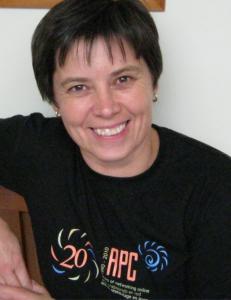Former New Zealand human rights commissioner Joy Liddicoat has just joined APC to lead a new Internet Rights are Human Rights campaign. Although she is busy getting ready for Internet Governance Forum consultations on May 18-19, she took a few moments to talk to APCNews.
APCNews: What is your human rights background?
 Joy Liddicoat: I’ve always had an interest in social justice. I think it was part of my family’s politics and values. In the 1980s when I was still a law student I started doing volunteer case work at the local community law centre. Later I became interested in women’s legal rights and was part of a group that established a women’s legal resource centre – I still do volunteer work for various community groups. Even though I was a lawyer working in private practice and then government, I didn’t come to fully work with human rights until the 1990s. I got involved in race and gender analysis and in 2001 attended the World Conference on Racism in Durban, South Africa. From 2002 until 2010 I was a part-time commissioner with the New Zealand Human Rights Commission. I worked with communities on human rights in the Asia-Pacific region, women’s rights, and rights for LGTBI people. I’ve had a real mix of human rights experience from local communities through to the United Nations.
Joy Liddicoat: I’ve always had an interest in social justice. I think it was part of my family’s politics and values. In the 1980s when I was still a law student I started doing volunteer case work at the local community law centre. Later I became interested in women’s legal rights and was part of a group that established a women’s legal resource centre – I still do volunteer work for various community groups. Even though I was a lawyer working in private practice and then government, I didn’t come to fully work with human rights until the 1990s. I got involved in race and gender analysis and in 2001 attended the World Conference on Racism in Durban, South Africa. From 2002 until 2010 I was a part-time commissioner with the New Zealand Human Rights Commission. I worked with communities on human rights in the Asia-Pacific region, women’s rights, and rights for LGTBI people. I’ve had a real mix of human rights experience from local communities through to the United Nations.
How did you get involved with the APC?
In 2007 I was part of the faculty for CREA delivering a week-long leadership program at the Institute on Rights, Activism and Development in Pune, India for women activists from South Asia. One of our guest speakers was Jac sm Kee from APC. Jac gave a fantastic presentation about ICTs and activism and the work of APC. She challenged all of us to be active in issues of “internet governance” — which I hadn’t even heard about! I was hooked, took the challenge seriously and got involved in my local internet community here in New Zealand. Jac later invited me to participate in an APC panel at the IGF in Vilnius in 2010.
What does APC mean that “Internet Rights are Human Rights”?
We all are born free and equal in dignity and rights. We have equal rights — to use public spaces (to enter shops, ride buses, go about our daily life), to education and to work. We all have the right to freedom from discrimination and harassment, to non-interference with our privacy by the State (ie no unreasonable search of our homes), freedom from arbitrary arrest and detention, and freedom of expression and freedom of association.
The challenge is how to articulate these rights in ways that are meaningful and real in relation to the internet and critical internet resources.
Human rights belong to people, not to networked computers or assigned domain names and IP numbers.
In 2006 APC released a revised Charter of Internet Rights which outlines the core principles behind the idea of internet rights. The key issues we face now include: how do we take rights beyond the keyboard and into the spaces we create and participate in? How can individuals and communities use the rights approach most effectively?
The concept of internet rights as human rights raises many interesting questions. The answers to some are clear. For example it is a violation of freedom of expression to seek to block access to websites and to unlawfully detain and harass bloggers.
But the answers are not so clear in all cases. Is it possible to balance the right to freedom of expression and the right to be free from discrimination and harassment? What is the role of governments and how is this monitored? For example the Erotics research revealed that limitations on access to the internet in public libraries in the United States of America by preventing access to key words such as “breast” were preventing women from finding out about breast cancer.
Where do you see this project going over the next year?
This will be an exciting year. APC really wants to move beyond awareness and toward actions that can be taken to promote internet rights as human rights. Specifically we are going to:
- Carry out up to five national, in-depth studies focusing on freedom of expression and freedom of association
- Map which global governance processes (and institutions) make decisions that impact on the state of internet rights
- Conduct research into the level of awareness of internet rights among human rights organisation, what they are doing to promote internet rights and look for opportunities for recourse against rights violators and
- Support and build capacity of women’s human rights defenders to use the internet safely and securely for their important work.
Some of this will be published in the 2011 edition of Global Information Society Watch on the state of internet rights in diverse contexts.